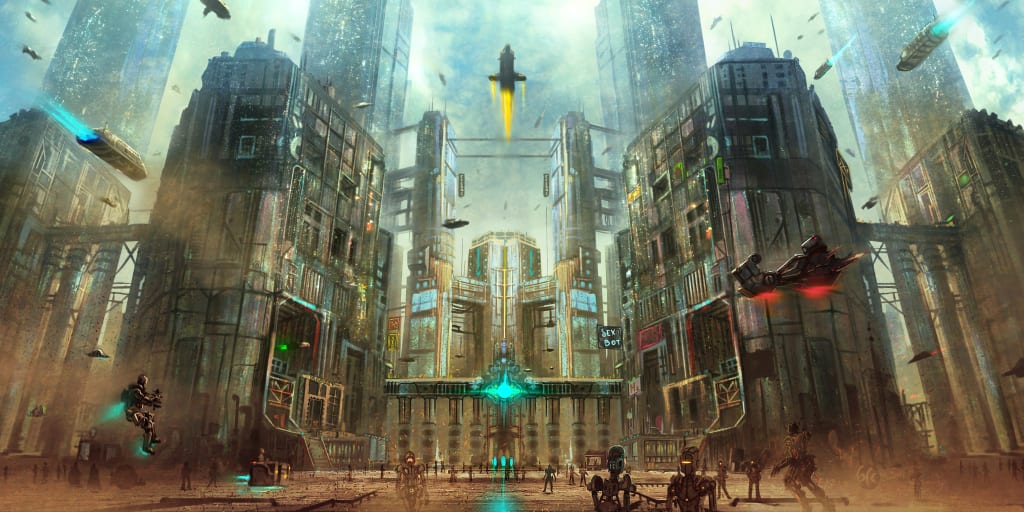
There weren’t always dragons in the valley, and the first time I’d claimed to see one, when I was six years old and obliviously happy, back when such feelings could be felt, my mother had locked me in the closet for the rest of the day. I was unused to such punishment at the time, could not fathom my wrongdoing, and thus was silent, huddling in the dark corner where the remains of our broken house robots piled high in preparation for the next Trading Day. When she let me out, the wisp of shimmery scales I’d waved to near the garden had gone, and she made me promise solemnly that I’d been making it up, that I’d seen no such thing, and that lying was for children. Never mind that I was a child: from that moment forth I was no longer.
The second time I saw one, I was eleven, and the city was in turmoil. A string of inexplicable murders targeting the rich and politically powerful was shaking the city’s leadership to its core, and everyone feared our General would be next. She was guarded day and night, her body shrouded in a silvery sheen of sensors that tracked every movement within ten yards and would shunt her body from side to side in anticipation of attack. My father whistled softly when he saw it; that kind of AI, he said to my brother and me, would either save someone’s life or drive them mad. The General had been walking (unusual in itself, for she was usually borne) to the city center podium, where she always delivered news. I will never forget how her limbs jerked spastically, how her eyes darted, and her shoulders hunched, flinching in response to whatever the AI was murmuring in her brain. Even if it does save her life, she’ll go mad anyway, I thought, and that’s when I saw it: the shimmer of a massive, luminescent figure behind the General’s podium. It seemed to flicker with the shifting of the light and I squinted impatiently, trodding on my brother’s feet until he shoved me away. The dragon (though I did not know it for what it was at the time) waited until the General was standing at her podium, and then the shimmering light warped, reaching forward to engulf her. She sank to the ground, the crowd shouted in panic, and I stared dumbstruck as, from within the flash of silver and translucent scales, the slight figure of a man seemed to slink away. Later, listening to onlookers excitedly recount the story, no one mentioned the scales, or the shimmering light, or the man, and I knew enough not to mention it myself. It was the year 2077, and no one believed in magic.
My mother, strangely enough, was one of those most impacted by the General’s death. Generally disdainful of any occurrence that could not be immediately explained by science, she shocked both my father and I by making the sign of the cross upon hearing the news. “The sensors should have saved her,” she said to my father, her voice quavering, “how could it have happened?”
None of us knew; no one in the city knew. Artificial intelligence was in its infancy in those years; like fledging baby birds leaping free of the nest before their time, many of the grander designs had missed one or two nuances on their way to fruition, and thus failed at unexpected, occasionally crucial, moments. Most families in the city owned inexpensive house robots for basic services - cleaning, cooking, running errands - and operator robots successfully operated nearly all of the city’s transportation, but other than that, there was nothing flashy on the market yet. Most of the AI humming along in the background of our lives was invisible: helpful, but only noticeable if it were gone, like the nearly flawless wastewater monitoring systems that told each family what dietary supplements they needed, or the smart sensors in the pavement that foresaw cracks and filled them before any potholes could form. These things were commonplace, and explainable; but we could not fathom the science of the General’s bodysuit sensors, nor understand why they had failed her.
And I, of course, was struggling with my private inexplicable event. Even at eleven years old, I knew that claiming I’d seen clues to the General’s death would have consequences for me, and I knew that my family would be ashamed of such a claim without evidence to back myself up. So of course I said nothing. But I could not ignore the memories, and over and over I would replay the scene: the shimmery movements, the yaw of light enveloping her, and then the form of a human, darting away, leaving the General’s body on the ground. I grew more and more confused: had I merely imagined the light and the scales, and in fact had seen the murderer in flesh and blood? Had the murderer used some simple trick to hide his form until the deed was done? It was all somewhat plausible, but did not explain why no one else had seen the same, and I could not discount my own certainty that there was more to the story than I knew. That I had witnessed something that would change my life, when I learned what it was.
As it were, it was to be another ten years before that day came to pass. What happened was, I finally met a dragon.






Comments
There are no comments for this story
Be the first to respond and start the conversation.